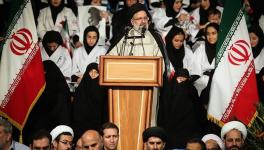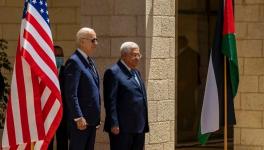Egyptian Uprising and Morsi's Ouster: Two Opposing Views
Newsclick is putting up two opposing views of Morsi's ouster in Egypt. Samir Amin, the internationally known economist, talks about the last year in Egypt with the Brotherhood in power in an interview by Giuseppe Acconcia of openDemocracy. He calls it a democratic farce and has welcomed the ouster. As'ad AbuKhalil questions this ouster in his column in Al Akhabar, arguing that left and secular forecs would have reacted very differently if the ouster was not of Brotherhood, but any other elected force. He believes that this coup will increase the shelf-life of the Brotherhood and make real democracy in Egypt less likely.
A Year of Democratic Farce
Samir Amin
Samir Amin, Egyptian philosopher and economist, director of the Third World Forum in Dakar, talks about the last year in Egypt with the Brotherhood in power, interviewed by Giuseppe Acconcia.
On 30 June 2012, Mohammed Morsi took over as the Mubarak successor. However, on the occasion of the first anniversary of the Muslim Brothers’ victory when this interview took place, bloody clashes broke out in the country.
Acconcia: What do you think about the Tamarod’s campaign?
Samir Amin: The Tamarod’s campaign for the Morsi dismissal is magnificent. Millions of people signed their names after giving deep political consideration to what they were doing: something totally ignored by the international mainstream media. They represent the majority of all the electoral constituencies, but they do not have any voice. The Muslim Brothers wield political power and like to think they can control 100% of the votes. Thus, they ensured members of the movement in every public sector. Their way of managing the country is informed by a type of crony capitalism which simply does not leave any room for the opposition figures and technocrats who had some power even in the Mubarak era.
A: This is happening during the worst economic crisis of recent decades
Samir Amin: There is more than an economic crisis. Islamists have only ultraliberal answers to give to the crisis: they have replaced the capitalists’ bourgeois clique that were Mubarak’s friends with reactionary businessmen. Moreover, their goal is quite simply to sell off public goods. The Brotherhood is hated by Egyptians because it continues with the same policies as its predecessor.
A: Maybe worse in the case of the Islamic Finance Bill?
Samir Amin: It is theft to attach derisory prices to goods that are worth billions of dollars. These are not the usual privatizations that reactionary regimes indulge in, selling off goods at their economic value. This is pure fraud more than a privatization.
A: Recalling the stages of this year with the Brotherhood in power - Morsi won after eight days of uncertainty and finally the elimination of the Nasserist, Hamdin Sabbahi, in the first round. Were the 2012 presidential elections manipulated?
Samir Amin: There was massive electoral fraud. Hamdin Sabbahi could have passed into the second round, but the US Embassy did not want it. European observers listened to their American diplomatic counterparts and turned a blind eye to the fraud involved. Moreover, the five million votes for Sabbahi were squeaky clean and highly motivated. On the other hand, the five million votes for Morsi came from the most wretched part of the population, devoid of political conscience: the votes of people willing to be bought off for a piece of bread and a glass of milk.
A: But would you agree that the sharpest clashes between the presidency and demonstrators broke out last November as a consequence of the presidential decree that extended Morsi’s powers?
Samir Amin: Morsi got going with a few weeks of demagogic speechifying, promising to listen to the other political contestants. After that, it soon became clear the extent to which the President was a puppet with the Gulf countries pulling the strings out of sight. He became a mere instrument of the murshid’s will - that of Mohammed Badie, Supreme Guide of the Muslim Brotherhood.
A: The historic support to the Palestinians had been shelved as well?
Samir Amin: The Egyptian Muslim Brothers support Israel, like the Gulf countries and Qatar do. They have always adopted an anti-Zionist discourse, but this was just an ongoing deception. The Qatari Emir, for example, is quite used to saying one thing and then doing the opposite, given the complete absence of public opinion. Now Egypt is supporting the worst type of opposition in Syria, as do the most reactionary western powers. The end result is that the majority of the western weapons furnished to the rebels are being used to finance the very worst outcome in Syria.
A: Is this why Morsi supported the creation of a Free Trade Area in the Sinai, favouring an economic relationship with Israel?
Samir Amin: This is a huge loss to Egypt. The effects of the new Free Trade Area will not be the imagined industrialization of the region, but the perpetration of a huge fiscal fraud. This will strengthen small mafias and the dismantling of public assets. In the end, the Brotherhood would accept all the conditions of the International Monetary Fund and the expected loan will accordingly come to fruition despite the fact that corruption and financial scandal have spread all over the country.
A: So how do you see the acceptance of the Constitution written by the Muslim Brotherhood, last December?
Samir Amin: This is a dictatorship of the majority. However, judges put up the strongest and indeed an unprecedented fight against the ratification of the constitutional referendum results. But it is clear that the ultimate goal of Freedom and Justice (the political party of the Brotherhood) is to build-up a theocracy on the Iranian model.
A: To conclude, is there anything left to preserve in this year of Morsi’s presidency?
Samir Amin: The lumpen proletariat is easily manipulated, and a fortiori would not obtain anything by the upheaval Morsi’s overthrow will bring. Moreover, the division of power the Brotherhood has with the army who is behind the scenes, ready to intervene, is full of ambiguity. The military personnel, as a class, are corrupt - a corruption guaranteed by American help, and carefully composed of segments of different classes, divided into political currents, many of them close to the Brotherhood and the Salafists.
However, with normal elections, with a period of democratic preparation, the Brotherhood will be beaten. But if this is not going to happen, next October there will be a more repressive climate and the vote will be manipulated by widespread falsification as happened on the previous occasion.
Courtesy: openDemocracy, July 4, 2013
A Democratic (and Military) Coup in Egypt?
As'ad AbuKhalil
First, I should state that I have never called for democracy in the Arab world. Not that I want to preserve the tyrannical order, but there are many conditions that have to be met before the call for democracy in the Arab world becomes meaningful. How can democracy be meaningful when Western countries and Gulf Cooperation Council (GCC) countries (and Iran) all inject funds to their side (to the tune of billions of dollars)? The last Lebanese election was largely won by Saudi money, just as the campaign of Ahmad Shafiq in the last presidential election had the support of GCC countries (and most likely of the US and EU countries).
And how can democracy be meaningful when the US interferes in all aspects of policy in all countries of the region? And how can democracy be meaningful when Israel occupies Arab lands, and perpetrates aggression, and forms terrorist/espionage networks throughout the Arab world? And in light of the acute social injustices in the region (the Middle East has one of the worst income maldistribution in the world), what does democracy have to offer to poor people when people with billions can get themselves elected (the elections in Tripoli in North Lebanon are largely elections between billionaires)?
Democracy (unless we are speaking about a specific kind of democracy that goes even beyond the promises of Radical Democracy) does not offer solutions to social-economic injustices. Quite the reverse, democracy in the Arab world (thanks to the intervention by Western governments and GCC countries) merely serve to put wealthy individuals with financial ties to the West in power. Finally, maybe democracy can become a priority once we establish the conditions in which democracy – real non-formal electoral democracy – can prosper and grow.
But the coup in Egypt has been very revealing. Imagine just for a minute that the coup overthrew a democratically-elected liberal quasi-secular government. You can easily imagine the international uproar and the fury of liberal intellectuals worldwide. All Middle East progressive would join forces to reverse the results of the coup. But the victims of this coup are the uncouth Islamists of the Muslim Brotherhood. To be sure, the Brotherhood made a Faustian bargain with the US and Israel, by which they were allowed to rule and to receive Western support in return for security-military cooperation with Israel. The New York Times never fails to remind readers that the Obama administration was very pleased with the services that Mursi had rendered during the latest Israeli war of aggression on Gaza.
Let’s face it: Democracy (for its Western and Arab advocates) is a mere excuse to create conditions to put the desirable party in power, or to embarrass a ruling party that one is opposed to. Thus the US wants democracy – or so it says because in reality it prefers a dictatorship all along – in Syria and Iran, but not in the rest of the Arab countries. Why would the US choose democracy when the Arab potentates can deliver so many favors and services without having to consult with messy legislative bodies? The US wants democracy only when it can guarantee the victory of its puppets: The US insisted on an immediate election back in 2005 in Lebanon because it knew the Hariri blood would serve its clients. Yet, in 2013, it did not press for elections in Lebanon and it did not mind that the parliament extended its mandate because the results of the elections can’t be guaranteed.
The US wanted democratic elections in Gaza until Hamas won. And now, it never voices its objection that its puppet – and the puppet of Israel – Mahmoud Abbas serves as a “president” when his term ended a few years ago.
Similarly, the Ikhwan are eager to have elections when they feel that they can win, while their secular opponents are eager for elections only when they feel that the Ikhwan can’t win. The last Egyptian election was very close, and the elected president, Mursi, acted and ruled as if he has a “mandate” by all the Egyptian people. But this is hardly a reason for the justification of a coup against him. Many American presidents act as if they have a mandate after they win a very close election. Some opponents of Mursi (Western and Arab) list a number of reasons as to why Mursi had to be overthrown by force: from not including women in positions of power (this according to a former US official), to not being flexible with his political rivals, to attempts to control the press. But all those sins are committed in Western democracy, and they can’t be expected to legitimize and justify a military coup.
It is understandable that Arab seculars are jubilant over what happened in Egypt. After all, the Ikhwans are not appealing on any level to those people (or to me, certainly). And they keep referring to the 20 or 30 million who took to the streets to protest the rule of Mursi. But that is not how conflicts in a democracy are settled; they are settled at the ballot box and not in the streets. I don’t wish to be a stickler about democratic procedures when I am not an advocate for democracy, but these are the basics of democratic rule. And the other side has millions too, and they helped win them the last presidential election despite the pumping of Saudi and American money to Shafiq (and Qatari money to Mursi).
Furthermore, beyond the immediate celebration of the end of the Ikhwan rule, what will the consequences of this anti-democratic move be? How will it affect the behavior of Ikhwan and even other Islamists in the region? Will they be blamed if they are pushed underground to attempt to seize force through undemocratic means? What if the Ikhwans (when they are in the opposition) pursue the same tactics as their rivals? What if they take over the streets and engineer a military coup to protest against the rule of a rival who was democratically elected a year ago?
And who will be empowered in this coup, especially in the transitional period where the rules of the game will be set? Will they not be the Mubarak holdovers (fulul) who fill the top echelons of the justice system in Egypt? Are they not the leadership of the military-intelligence apparatus? Who is to guarantee that the military won’t intervene if an elected body in Egypt decides to scrap, for example, the humiliating Israeli-Egyptian peace treaty? What if the newly elected legislative body in Egypt were to decide to place the military-intelligence budget under the oversight of the parliament? And if one year is enough to discredit a newly elected president, why not make the term of the president one year only, or six months? And what happens to the constitutionally designated norms and procedures for the removal of a sitting president?
Let’s face it: The Egyptian protesters who launched the uprising against Mubarak were snookered. Young secular activists started the Egyptian uprising and in their enthusiasm they were clearly deceived and their revolutionary momentum undermined. Instead of pushing to unseat all Mubarak officials and cronies from all offices of the state, and instead of pushing for a radical change in the foreign policies of the country (as was expressed by them through protests at the US, Israeli, and Saudi embassies), the young people of Egypt were persuaded that the ultimate goal (or fruit) of a “revolution” is an election. They were rushed into an election that was not necessary at all. Had the young protesters of Egypt (who initially did not have Ikhwan in their ranks) pushed for a radical transformation of Egyptian society, economy, and politics, the uprising that started back in 2011 would have developed into a full-blown revolution.
And what if the new election, that the military council has promised, produces a new set of Islamists? What will the secular foes of the Brotherhood do? Will they go back to the street to unseat (with the cooperation of the military command) a sitting president? And why are young Egyptians who speak of revolution putting their faith in a military-intelligence apparatus that is part and parcel of the Sadat-Mubarak security regime, which is sponsored by the US? Who believes that the military apparatus truly has a democratic impulse? If it could not put up with the non-democracy of Mursi for one year, why did it put up with the dictatorship of Sadat and Mubarak for decades?
This is a coup d’etat that has the support of the secular Arab intellectuals who oppose the Ikhwan (either because they are part of the Saudi-UAE propaganda apparatus or because they are sincere and honest secularists who oppose the Ikhwan on ideological grounds). It was easy to remove Mursi from power, but it will be far more difficult to remove the Ikhwan from society. The Muslim Brotherhood was doing a great job in shooting itself in the foot and even in the head on regular basis, but this coup will undoubtedly increase the shelf-life of the Brotherhood. The coup that was launched in the name of democracy is destined to make real democracy less likely in Egypt.
Courtesy: Al Akhbar English
July 5, 2013
Disclaimer: The views expressed here are the author's personal views, and do not necessarily represent the views of Newsclick
Get the latest reports & analysis with people's perspective on Protests, movements & deep analytical videos, discussions of the current affairs in your Telegram app. Subscribe to NewsClick's Telegram channel & get Real-Time updates on stories, as they get published on our website.
























